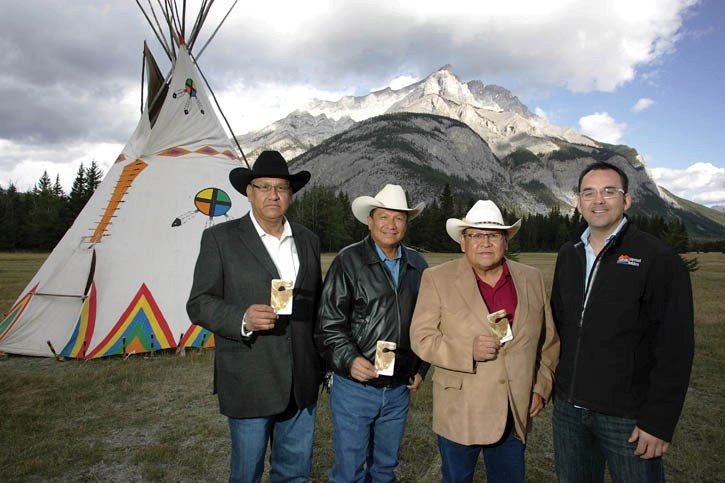In recognition of the long-standing connection the people of the Stoney Nakoda First Nations have to the mountains and valleys of Banff National Park, Parks Canada has created a special entry pass specifically for the Stoney, ending what has been a long-standing dispute about access to traditional lands.
This unique pass, which features an image of a bison and text in three languages – English, French and Stoney – is good for life and it allows the Stoney people of the Bearspaw, Chiniki and Wesley bands to access their traditional lands in the park free of charge.
Throughout their history in the Rocky Mountain region, the Stoney have travelled into the Rockies to hunt, gather medicinal herbs and partake in celebrations and ceremonies.
“Surrounding us are these sacred mountains, which have many names that have been passed down from generation to generation and our people know the names of these mountains,” Bearspaw Chief Darcy Dixon said during a ceremony held at the Banff Indian Grounds not far from the base of Cascade Mountain on Monday (Sept 10). “The streams, the valleys and the hot springs. We also have names that were given to them long before the railroad came through and those names are still active in our community among our elders today.”
But with the creation of Canada’s national park system in 1885, aboriginal people were largely excluded from the park, except during Banff Indian Days.
“Over the years our people would have to sneak into the park to gather medicine for their healing ceremonies; as of today, we are no longer going to be doing that,” Dixon said.
Wildrose MP Blake Richards said the launch of the entry pass signals Parks Canada’s commitment to renew and deepen its relationship with First Nations people.
He added it is also a step in “strengthening a shared sense of stewardship of this very special place.”
The pass and the privilege it provides the Stoney people stems from a Memorandum of Understanding (MOU), a partnering initiative signed between Parks Canada and the Stoney in 2010. The MOU opened the door for the Stoney Nakoda Family Camp, a revival of Banff Indian Days, and the mural painted by Stoney artist Roland Rollinmud that will hang in the refurbished Cave and Basin National Historic Site once it re-opens this winter.
“In 2010, Parks Canada and the Stoney Nakoda First Nations agreed to work together to promote awareness, understanding and respect for the history, culture and sacred places of the Stoney Nakoda First Nations in and around the national parks,” Richards said. “The Stoney Nakoda First Nations entry pass to Banff National Park fulfills on this important partnering initiative and this is a significant step forward on a journey together.”
Bruce Labelle and Ernest Wesley said the MOU and the lifetime entry pass add to the recognition that the Stoney people have known and used the lands in the Banff region since long before the park was founded.
“Today’s ceremony is an important symbolic, practical step to reintroduce our inherent right to access these national park lands, which have been a part of our history for many generations,” Labelle said.
Including aboriginal people in national parks is a cross-Canada movement that enriches the parks and the experience for Canadians, according to Banff Field Unit Superintendent Dave McDonough. In Banff, the MOU is providing a tangible benefit.
“It enables us to move on initiatives like this so it is a very important agreement. There has been a real tangible improvement with engaging aboriginal people and including aboriginal people across the country,” he said.




